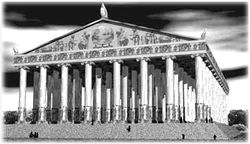Template:Ephesus
Temple of Diana

Temple of Diana in Ephesus - Christians were accused of robbing the Temple of Ephesus. It served as an underwriter for social welfare insurance and a central bank for at least the 127 countries which built the temple.
Were Christians actually bank robbers?
Or was something lost in translation?
The great historian of the period, Aristeides, defined Ephesus as "Asia's greatest center of trade and banking".[1]
- "The temple possessed valuable lands; it controlled the fisheries; its priests were the bankers of its enormous revenues. Because of its strength the people stored there their money for safe-keeping; and it became to the ancient world practically all that the Bank of England is to the modern world."[2]
“The temple was so rich and prosperous that it became, with the temple in Jerusalem, one of the world’s first banks.”[3] Read Investing in Diana.
In Ephesus, there was an uproar about the apostles with a reference to robbing the temple. What was actually going on in these temples?
We have seen that the temple built by Herod collected vast sums of money and contained a great treasury. Through its daily administration, it oversaw a welfare program for the needy, built aqueducts, and provided common government services.
It contained a great vault, which was considered one of the safest depositories in Asia Minor. This temple actually functioned as a bank. What we might call the “high priest” was also a credit officer making loans and collecting interest, managing valuable property, and in charge of security for those who deposited valuables in the temple in the course of commerce and trade.
It was was literally an underwriter of national social insurance systems including the coinage of money and the issuing of scrip. Ephesus was a World Bank of the world order of Rome.
Some temples acted as investment houses for mining, trade, and even military ventures. Great returns could be had with such investments in temples like Janus and Diana. The members were investors and the Temple of Diana could seat over 24,000 people.
Christians were investing in the Kingdom of God which was another way of providing social security to voluntarism and other charitable practices. Many who had once invested in the Ephesus were now investing in the system of daily ministration set up and appointed by Jesus through the early Church.